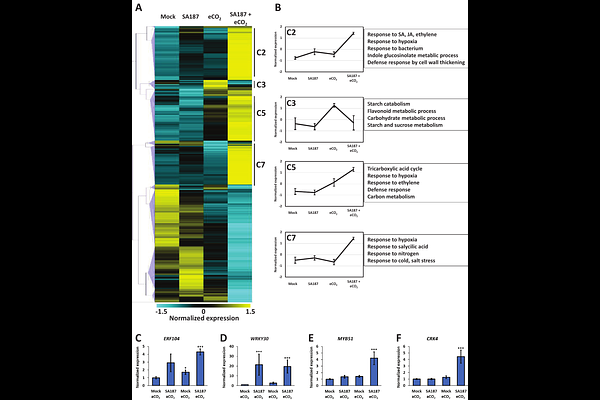Enhancement of Arabidopsis growth by Enterobacter sp. SA187 under elevated CO2 is dependent on ethylene signalling activation and primary metabolism reprogramming

Enhancement of Arabidopsis growth by Enterobacter sp. SA187 under elevated CO2 is dependent on ethylene signalling activation and primary metabolism reprogramming
Ilyas, A.; Mauve, C.; Pateyron, S.; Paysant-Le Roux, C.; Bigeard, J.; Hodges, M.; de Zelicourt, A.
AbstractAs atmospheric CO2 levels continue to increase, optimizing the CO2 fertilization effect which often falls short of its potential due to the physiological and metabolic limitations of plants becomes crucial. This study investigates the role of Enterobacter sp. SA187 (SA187), a plant growth-promoting bacterium, in enhancing growth and development of Arabidopsis thaliana under elevated atmospheric CO2 (eCO2) conditions. While SA187 inoculation did not have major effects under ambient CO2, it was found to significantly enhance root and shoot biomass, and to increase N- and reduce C-contents under eCO2. Moreover, transcriptomics and metabolomics suggested that SA187 modulated phytohormonal homeostasis, with activation of the salicylic acid, jasmonic acid and ethylene signalling pathways, and increased primary metabolism including the TCA cycle, N and carbohydrate metabolisms. Finally, the growth-promoting effects of SA187 were shown to be mediated through ethylene-dependent pathways, as evidenced with the ethylene-insensitive mutant ein2-1 which did not show similar benefits in plant fresh weight and altered gene expression. This beneficial plant-microbe interaction under eCO2 in a non-leguminous plant highlights a novel aspect of microbial influence on plant physiology in the context of climate change. These insights underscore the potential of utilizing SA187 to enhance plant performance and adaptability in future high CO2 environments, providing a sustainable approach to agricultural productivity as global CO2 levels increase.